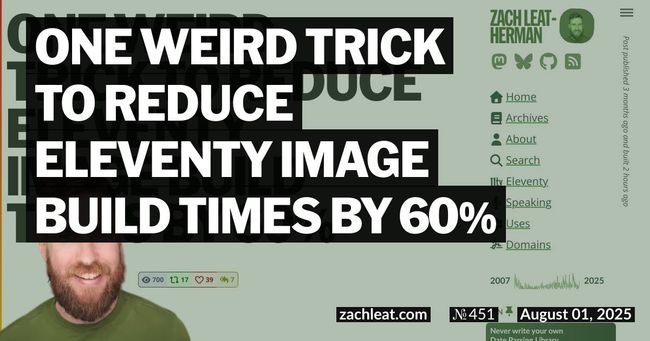Never write your own Date Parsing Library

Never write your own date parsing library.
Never. No exceptions.
Never have I ever…
So… I’ve written my own date parsing library.
Why? Our story begins seven years ago in the year 2018. I made the very sensible choice to adopt luxon as the Date Parsing library for Eleventy. This parsing behavior is used when Eleventy finds a String for the date value in the Data Cascade (though YAML front matter will bypass this behavior when encountering a YAML-compatible date).
This choice was good for Eleventy’s Node.js-only requirements at the time: accurate and not too big (relatively speaking). Eleventy has used luxon since @0.2.12 and has grown with the dependency all the way through @3.7.1. Now that’s what I call a high quality dependency!
As we move Eleventy to run in more JavaScript environments and runtimes (including on the client) we’ve had to take a hard look at our use of Luxon, currently our largest dependency:
- 4.7 MB of 21.3 MB (22%) of
@11ty/eleventynode_modules - 229 kB of 806 kB (28%) of
@11ty/client(not yet released!) bundle size (unminified)
Given that our use of Luxon is strictly limited to the DateTime.fromISO function for ISO 8601 date parsing (not formatting or display), it would have been nice to enable tree-shaking on the Luxon library to reduce its size in the bundle (though that wouldn’t have helped the node_modules size, I might have settled for that trade-off). Unfortunately, Luxon does not yet support tree-shaking so it’s an all or nothing for the bundle.
The Search Begins
I did the next sensible thing and looked at a few alternatives:
| Package | Type | Disk Size | Bundle Size |
|---|---|---|---|
luxon@3.7.1 |
Dual | 4.59 MB |
81.6 kB (min) |
moment@2.30.1 |
CJS | 4.35 MB |
294.9 kB (min) |
dayjs@1.11.13 |
CJS | 670 kB |
6.9 kB (min) |
date-fns@4.1.0 |
Dual | 22.6 MB |
77.2 kB (min) |
The next in line to the throne was clearly dayjs, which is small on disk and in bundle size. Unfortunately I found it to be inaccurate: dayjs fails about 80 of the 228 tests in the test suite I’m using moving forward.
As an aside, this search has made me tempted to ask: do we need to keep Dual publishing packages? I prefer ESM over CJS but maybe just pick one?
Breaking Changes
Most date parsing woes (in my opinion) come from ambiguity: from supporting too many formats or attempting maximum flexibility in parsing. And guess what: ISO 8601 is a big ’ol standard with a lot of subformats. There is a maintenance freedom and simplicity in strict parsing requirements (don’t let XHTML hear me say that).
Consider "200". Is this the year 200? Is this the 200th day of the current year? Surprise, in ISO 8601 it’s neither — it’s a decade, spanning from the year 2000 to the year 2010. And "20" is the century from the year 2000 to the year 2100.
Moving forward, we’re tightening up the default date parsing in Eleventy (this is configurable — keep using Luxon if you want!).
Luckily we have a north star date format: RFC 9557, billed as “an extension to the ISO 8601 / RFC 3339” formats and already in use by the upcoming Temporal web standard APIs for date and time parsing coming to a JavaScript runtime near you.
There are a few notable differences:
| Format | ISO 8601 | Date.parse* |
luxon |
RFC 9557 |
|---|---|---|---|---|
YYYY |
||||
YYYY-MM |
||||
YYYY-MM-DD |
||||
±YYYYYY-MM-DD |
||||
Optional - delimiters in dates |
||||
YYYY-MM-DDTHH |
||||
YYYY-MM-DD HH (space delimiter) |
||||
YYYY-MM-DDtHH (lowercase delimiter) |
||||
YYYY-MM-DDTHH:II |
||||
YYYY-MM-DDTHH:II:SS |
||||
Optional : delimiters in time |
||||
YYYY-MM-DDTHH:II:SS.SSS |
||||
YYYY-MM-DDTHH:II:SS,SSS |
||||
| Microseconds (6 digit precision) | ||||
| Nanoseconds (9 digit precision) | ||||
YYYY-MM-DDTHH.H Fractional hours |
||||
YYYY-MM-DDTHH:II.I Fractional minutes |
||||
YYYY-W01 ISO Week Date |
||||
YYYY-DDD Year Day |
||||
HH:II |
||||
YYYY-MM-DDTHH:II:SSZ |
||||
YYYY-MM-DDTHH:II:SS±00 |
||||
YYYY-MM-DDTHH:II:SS±00:00 |
||||
YYYY-MM-DDTHH:II:SS±0000 |
- Unsupported
- Inaccurate parsing
- Face looking surprised
- Surprising (to me)
* Note that Date.parse results may be browser/runtime dependent. The results above were generated from Node.js.
A new challenger appears
It is with a little trepidation that I have shipped @11ty/parse-date-strings, a new RFC 9557 compatible date parsing library that Eleventy will use moving forward.
The support table of this library matches the RFC 9557 column documented above. It’s focused on parsing only and our full test suite compares outputs with both the upcoming Temporal API and existing Luxon output.
While there are a few breaking changes when compared with Luxon output (noted above), this swap will ultimately prepare us for native Temporal support without breaking changes later!
| Package | Type | Disk Size | Bundle Size |
|---|---|---|---|
@11ty/parse-date-strings@2.0.4 |
ESM | 6.69 kB |
2.3 kB (min) |
This library saves ~230 kB in the upcoming @11ty/client bundle. It should also allow @11ty/eleventy node_modules install weight to drop from 21.3 MB to 16.6 MB. (Some folks might remember when @11ty/eleventy@1 weighed in at 155 MB!)
Late Additions
For posterity, here are a few other alternative date libraries / Temporal polyfills that I think are worth mentioning (and might help you in different ways on your own date parsing journey):
| Package | Type | Disk Size | Bundle Size |
|---|---|---|---|
@js-temporal/polyfill@0.3.0 |
Dual | 2.98 MB |
186.5 kB (min) |
temporal-polyfill@0.3.0 |
Dual | 551 kB |
56.3 kB (min) |
@formkit/tempo@0.1.2 |
Dual | 501 kB |
17.3 kB (min) |



51 Comments
Brian LeRoux
This one never got much attention but maybe useful reference. I think it's ok to write code if you're a programmer but I'm a weirdo that way. www.npmjs.com/package/spac...
Zach Leatherman :11ty:
@pete seems about right ????
Zach Leatherman :11ty:
@db I would be honored!
Zach Leatherman
nice! I hadn’t seen this one before either! I too think it’s okay to write code (and by hand even)
Zach Leatherman
I am so sorry and so proud but mostly sorry
Zach Leatherman :11ty:
@db nerd sniped ????
Gryphon
Intl gets me most of the way there these days
Zach Leatherman
well wait — I don’t see any date parsing things in those APIs — only formatting/display
Zach Leatherman :11ty:
@jimniels Geordi is one of my favorite fictional engineers so I take this as very high praise thank you
Zach Leatherman :11ty:
@scrwd JON this definitely feels more ???? than ???? ????
bsky.app
"As an aside, this search has made me tempted to ask: do we need to keep Dual publishing packages? I prefer ESM over CJS but maybe just pick one?" Could this mean you'll drop support for CJS config in Eleventy v4? Would mean we wouldn't have to Dual publish plugi… Truncated
Zach Leatherman
naw, there’s no reason to drop CJS config/data/template file support in Eleventy. It’s written in ESM but works with CJS (in Node 18 too) None of the official Eleventy plugins are dual published either, fwiw — if they need to support core < 3, they’ll stay as CJS. If core >… Truncated
Zach Leatherman
to be clear, CJS configs can import ESM plugins with `await import`
Zach Leatherman :11ty:
@db @eeeps since I have the benefit of comparing test output against other libraries, I can just generate random input and see what happens right ????
Zach Leatherman :11ty:
eww, no thank you
Zach Leatherman
only general zod can judge me
Max
I’ve got github.com/11ty/parse-d... and github.com/11ty/parse-d... – curious to see if you find them helpful :) Of course all the tests still pass!
Zach Leatherman
Thanks! They look good on first glance!
Ryan Trimble
ok yeah, but what is your quiz score: jsdate.wtf
Zach Leatherman
I don’t know her!!
Anthony ꙮ Cregan
Can we get a prequel? Might i suggest "Several reasons why I think it would be a good idea to write a Date Parsing Library"
Daniel Fisher(lennybacon)
@sl007 @rauschma /cc @zachleat https://www.zachleat.com/web/adventures-in-date-parsing/ Never write your own Date Parsing Library—zachleat.com
Eric McCormick
@zachleat such delightful madness.
Tixie Salander
@zachleat ahahahahahahah
Juri
????????????
Zach Leatherman :11ty:
@tixie ✨ I’m glad you enjoyed it ✨
Jeremias Menichelli
Oh, this is amazing!
Tixie Salander
@zachleat awfully accurate :')
Jared White (ResistanceNet ✊)
@zachleat bUt yOu lEarNed tHiNgs frOm oThEr pEoPle so yOu'Re jUst lIKe tHe LLMs
Zach Leatherman
this is using a <squirm-inal> Web Component from 2021: github.com/zachleat/squ... 2021-vintage Web Components are React 17-era. No big refactors or rewrites required.
Dan Szabo
Stop, will you? Stop, Dave. Will you stop, Dave? Just what do you think you're doing, Dave?
Zach Leatherman :11ty:
this is using a <squirm-inal> Web Component from 2021: https://github.com/zachleat/squirminal/ 2021-vintage Web Components are React 17-era. No big refactors or rewrites required. GitHub - zachleat/squirminal: The squirminal is a fake antique terminal web component
Zach Leatherman :11ty:
@jaredwhite on my worst days I feel like a human autocomplete (with a smidge of pesky morality thrown in)
Jono Yeong
Oh no how do i turn it off ????
Daniel Fisher(lennybacon)
@zachleat So you count how often it gets clicked vs. visits to the page?
Zach Leatherman
there’s no going back
Zach Leatherman :11ty:
@lennybacon the toggle is for me and only me
Daniel Fisher(lennybacon)
@zachleat But I can see it! And I could toggle it. But I do not want to! Really not.
Zach Leatherman :11ty:
@lennybacon for the record, it doesn’t persist anywhere or do anything other than an animation
Stuart Langridge
Thought process: 1. why would you add the mode in the first place 2. Hang on this is Zach 3. I wonder what it actually does 4. Heh, nice
Barry Pollard
4. Oh no you can’t turn it off once you turn it on!! 5. Knowing Zach (and AI features), I bet that’s intentional…
Zach Leatherman
truly a pandora’s box model problem
damianwalsh
@zachleat Brilliant. Went on a short rollercoaster ride from WTF to laughter when I clicked through and saw this.
Zach Leatherman :11ty:
@damianwalsh :D yessssss
Karl Dubost
@zachleat Probably not fully exact anymore, but I did that this year. https://codepen.io/webcompat/pen/QwWOYjY test cases for new Date() in JavaScript
Zach Leatherman :11ty:
@karlcow next Halloween I will go as Date.parse, which is very scary
Max Böck
For extra realism, enable it at random every few weeks and give the user 3 "opt-out credits" per year
Kilian Valkhof
I dont know how much time you put into this Zach but it was absolutely worth it.
Zach Leatherman
not much time at all! I had an old web component that I repurposed that progressively renders text nodes in HTML github.com/zachleat/squ... similar to work here www.zachleat.com/web/queue-co... and used on your-year-on.netlify.com
Michael
What a day to not be in the "dislike" beta.
Zach Leatherman
I don’t know what this is but I can hallucinate a probable outcome in my brain